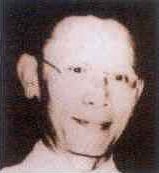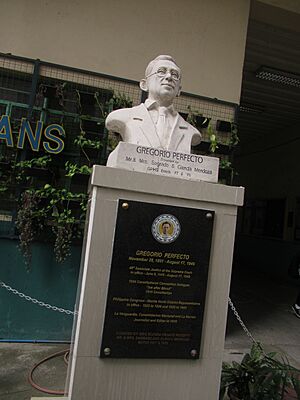Gregorio Perfecto facts for kids
Quick facts for kids
Gregorio Perfecto
|
|
|---|---|
 |
|
| 48th Associate Justice of the Philippine Supreme Court |
|
| In office June 6, 1945 – August 17, 1949 |
|
| Appointed by | Sergio Osmeña |
| Preceded by | None |
| Succeeded by | Felix Angelo Bautista |
| Member of the Philippine National Assembly from Manila's 1st District | |
| In office November 15, 1935 – December 30, 1941 |
|
| Preceded by | Francisco Varona |
| Succeeded by | District dissolved (Position next held by Engracio Clemeña) |
| Member of the Philippine House of Representatives from Manila's 1st District | |
| In office 1922–1928 |
|
| Preceded by | Juan Nolasco |
| Succeeded by | Francisco Varona |
| Personal details | |
| Born | November 28, 1891 Mandurriao, Iloilo, Captaincy General of the Philippines Kingdom of Spain |
| Died | August 17, 1949 (aged 57) Manila, Philippines |
Gregorio Milian Perfecto (November 28, 1891 – August 17, 1949) was an important Filipino journalist, politician, and jurist (a legal expert or judge). He served as an Associate Justice of the Supreme Court of the Philippines from 1945 to 1949. Perfecto was known for his strong belief in individual freedom and his unique writing style. He often wrote dissenting opinions while on the Supreme Court, meaning he disagreed with the majority of the judges.
Contents
Early Life and Education
Gregorio Perfecto was born in Mandurriao, Iloilo. When he was young, his family moved to Ligao, Albay, where he went to primary school. He finished high school at San Beda College in Manila.
Perfecto then went to Colegio de San Juan de Letran, where he earned his Bachelor of Arts degree. After that, he studied law at the University of Santo Tomas and got his law degree. In 1916, Perfecto passed the bar examinations and became a lawyer in the Philippines.
A Career in Journalism
After practicing law for a while, Perfecto started working as a journalist. He was a reporter for newspapers like La Vanguardia and Consolidacion Nacional. By 1919, he became the editor of the daily newspaper La Nacion.
During his time at La Nacion, Perfecto became known for fighting against corruption and dishonest public officials. He faced legal challenges several times because of his strong opinions, even from the Philippine Senate. However, the Philippine Supreme Court found him innocent of all charges between 1921 and 1922.
Becoming a Politician
In 1922, Gregorio Perfecto was elected to the Philippine Legislature. He represented the North District of Manila and served until 1928. In 1931, Perfecto became ill with polio, which left him unable to walk without crutches. Despite this, he recovered enough to continue playing golf.
Perfecto was a member of the Partido Democrata, a political party. He eventually became its general secretary and provisional president. One of the leaders of this party was Senator Sergio Osmeña, who would later appoint Perfecto to the Supreme Court.
In 1934, Perfecto was chosen as a delegate to the Constitutional Convention. This was a special meeting to write the 1935 Constitution, which is the main rulebook for the country. After the constitution was written, Perfecto famously signed the document using his own blood as ink.
After the Constitution was approved, Perfecto was again elected to represent the North District of Manila in the National Assembly. He served two terms, from 1935 to 1941. During this time, he supported laws to improve working conditions for laborers and to give women the right to vote.
Justice of the Supreme Court
In June 1945, after World War II ended and the Japanese occupation of the Philippines was over, President Sergio Osmeña appointed Perfecto to the Supreme Court. He served on the highest court until his death in 1949.
During his four years on the court, Perfecto wrote 172 majority opinions (decisions agreed upon by most judges) and over 200 separate opinions. Out of these, 195 were dissenting opinions, meaning he disagreed with the majority. He is the only Justice in Philippine Supreme Court history to have written more dissenting opinions than majority opinions. He dissented in about 20.6% of the cases during his time on the court.
There were attempts to remove Perfecto from office because he used his office as living quarters. However, he had permission from Chief Justice Manuel Moran to do this because of his physical disability. Perfecto believed these attempts were politically motivated, and they were not successful.
Perfecto's Legal Views
Gregorio Perfecto's dissenting and concurring opinions (where he agreed with the outcome but for different reasons) are often remembered more than his majority opinions. One important majority decision he wrote was Co Chiong v. Cuaderno. In this case, the court supported a law that gave Filipino citizens preference in renting public market stalls.
Perfecto's separate opinions show his strong belief in individual freedom. For example, in Raquiza v. Bradford, he argued that three Filipinos held by the United States military as Japanese spies should be freed. He believed people should not be held indefinitely without proper legal process.
In another case, Moncado v. People's Court, the majority of the court allowed evidence that was found through an illegal search. Perfecto strongly disagreed, writing: "May the government profit from an illegality... to serve its aims...?" He believed that justice should not be achieved through unlawful actions.
Perfecto also strongly defended press freedom. In In re Subido, a newspaper editor was found guilty of contempt for reporting a court decision before it was officially released. Perfecto admitted he was the source of the report. He defended the editor, saying he was doing a public service by publishing the truth and that press freedom was a constitutional right.
He also challenged the idea that the United States government had special legal power over crimes committed on American military bases in the Philippines. In Dizon v. Commanding General, Perfecto argued that this was unconstitutional because only Philippine courts should have such power. He criticized what he saw as the Philippine government being too submissive to the United States.
Perfecto believed that the Supreme Court should always review actions by the government's executive (President) or legislative (Congress) branches. He thought the court should ensure these branches followed the law, even if the issues seemed political.
Perfecto's Writing Style
Perfecto was known for his "picturesque language" in his opinions. Justice Isagani Cruz said his writing "earned him a special place in jurisprudence" and would "enliven generations of law students to come." His friend, Senator Tomas Cabili, suggested that Perfecto might have used strong language on purpose. He thought Perfecto wanted to make sure ordinary people understood what a true democracy meant.
Here are some famous quotes from his writings:
The present is liable to confusion. Our minds are subject to determinate and indeterminate ideological pressures. Very often man walks in the darkness of a blind alley obeying the pullings and pushings of hidden and unhidden forces, or the arcane predeterminations of the genes of human chromosomes.
Man is easily deceived into committing blunders or led into the most absurd aberrations. The mysterious genes which keep uninterrupted the chain of heredity, while permitting the transmission of the best qualities and characteristics, seems to lack the power of checking and staving off the tendencies of atavism. In the moral ctetology, either kind of characteristics and qualities may be originated and developed… To set two moral standards, a strict one for private individuals and another vitiated with laxity for the government, is to throw society into the abyss of legal ataxia. Anarchy and chaos will become inevitable. Such a double standard will necessarily be nomoctonous.
It is useless to panegyrize democracy as the best political system ever conceived, when once put into practice it is sabotaged by the double-dealing of the men on whose shoulders weighs the responsibility of making it a success. A sham democracy is a fertile breeding ground for any doxy that may offer the allurement of a promissory land, where the masses will enjoy better conditions of life.
Later Life and Legacy
Perfecto died on August 17, 1949, after a short illness. He was a Freemason but reconciled with the Catholic Church shortly before his death.
Before he died, Perfecto took the unusual step of asking the Supreme Court to rule that judges' and justices' salaries should not be taxed. The court decided in his favor after his death.
Years after his death, many of the decisions Perfecto had disagreed with were overturned by the Supreme Court. This showed that his dissenting views were often ahead of their time.
In 1958, a high school in Tondo, Manila was named Gregorio Perfecto High School in his honor.
Images for kids



